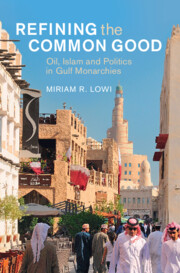Book contents
- Refining the Common Good
- Cambridge Middle East Studies
- Refining the Common Good
- Copyright page
- Dedication
- Contents
- Tables
- Acknowledgments
- Note on Transliteration
- Map of Gulf Monarchies and Neighboring States
- 1 Oil and Islam in the Gulf
- 2 Islamic Norms, Interpretations, Applications
- 3 The State and the Political Economy of Distribution
- 4 Society Responds
- 5 Imported Labor
- 6 Charity as Politics “Writ Small”
- 7 Islamic Banking and Finance
- 8 Reflections on Islam and Politics in the Oil Era
- Appendix
- Bibliography
- Index
- Series page
3 - The State and the Political Economy of Distribution
Published online by Cambridge University Press: 08 November 2024
- Refining the Common Good
- Cambridge Middle East Studies
- Refining the Common Good
- Copyright page
- Dedication
- Contents
- Tables
- Acknowledgments
- Note on Transliteration
- Map of Gulf Monarchies and Neighboring States
- 1 Oil and Islam in the Gulf
- 2 Islamic Norms, Interpretations, Applications
- 3 The State and the Political Economy of Distribution
- 4 Society Responds
- 5 Imported Labor
- 6 Charity as Politics “Writ Small”
- 7 Islamic Banking and Finance
- 8 Reflections on Islam and Politics in the Oil Era
- Appendix
- Bibliography
- Index
- Series page
Summary
I begin the analysis of oil-financed institutionalized practices with a focus on government transfers and subsidies, highlighting the variation in access to resources in Gulf monarchies. I describe various types of transfers: 1) universal – those, such as free health care and subsidized household utilities, which all citizens enjoy; 2) particularist – those which are extended to specific communities – as in allowances to members of tribes or royal families and contracts to business elites; 3) idiosyncratic – as in funds to men to assist with their marriage expenses. I note changes to government distributions from mid-2014 and the oil price downturn. I then explore matters of equity and exclusion, highlighting those social categories who are privileged and those who are discriminated against in access to distributions in these states. I argue that the hierarchization of society and the related variation in access to resources are both integral to the shaping of the national community and a means for the state to exercise control insofar as key social categories are appeased via the relative marginalization of others.
Keywords
- Type
- Chapter
- Information
- Refining the Common GoodOil, Islam and Politics in Gulf Monarchies, pp. 47 - 73Publisher: Cambridge University PressPrint publication year: 2024

